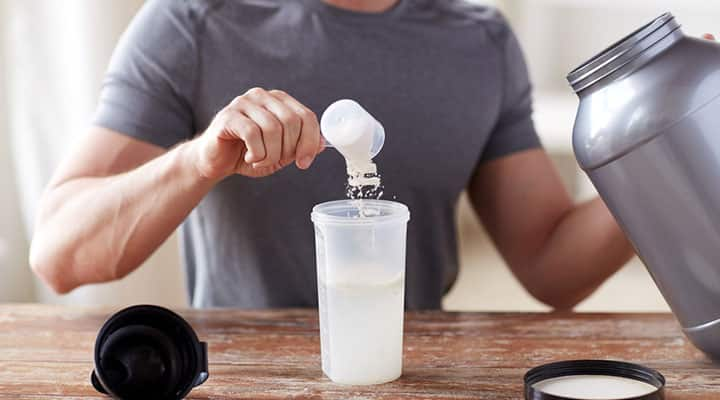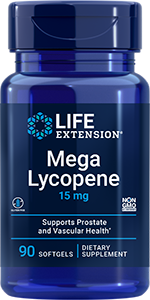
Top Supplements for Men
Published: June 2021
While everyone should be doing all they can to support a healthy lifestyle at any age, there is no doubt that men and women both have unique nutritional needs. There are hormonal differences, of course, and the aging process treats men and women a bit differently.
There are also lifestyle differences to take into account. Men have a (sometimes unfair) reputation for not being quite as health-conscious as women. Whether that stereotype doesn't apply to you, or you're indeed guilty of putting your health needs last, one thing applies to all men: a healthy diet, regular exercise regimen, getting adequate sleep, and an effective strategy for managing stress all make a difference in the quality of your life.
Supplementing with the right nutrients can help take your whole-body wellness to the next level. So, which supplements should men take? It can be difficult to know where to start, so how about with the basics?
Back to basics: foundational supplements every man should take

CoQ10, omega-3 fish oil and multivitamins have been touted as foundational supplements with healthy benefits for both men and women. From antioxidant support and brain health to prostate health (look for selenium in your multivitamin!), these three supplements are a comprehensive way to make sure you're filling in the gaps—but, they're only part of the picture.
According to Dr. Vanessa Pavey, Life Extension's Education Scientist, magnesium is another foundational nutrient for men to consider. The body needs magnesium for over 300 essential biochemical reactions, including relaxing the smooth muscles within the blood vessels. While this is important for cardiovascular health, research also supports magnesium's benefits for healthy sexual function as it relates to blood flow. These benefits work together to support overall male vascular health.
Magnesium also supports youthful memory and cognition, as well as energy metabolism, making it a great option to add to your supplement regimen. You'll find this nutrient in avocado, bananas, leafy greens, and nuts. But, most people don't obtain enough magnesium just from diet alone. As Dr. Pavey pointed out, it's estimated that 64% of American men do not meet adequate dietary intake of magnesium, so men "should consider being proactive early." The recommended dietary allowance (RDA) for magnesium in men is 420 mg/day.
Workout supplements for men: HMB and vitamin D

There's no doubt that exercise is part of a healthy lifestyle. And beyond working hard and pushing the limits at the gym, there are certain nutrients that can help you continue to get the most out of your workout.
Time to meet the combo of vitamin D and HMB. Beta-hydroxy beta-methylbutyrate, more commonly known as HMB, is a metabolite of the amino acid leucine, and it's become well known for maintaining healthy muscle mass and optimal exercise performance. Meanwhile, vitamin D, or the "sunshine vitamin," can also promote healthy muscle function and mitochondrial output, making it a great option for keeping your energy up during a workout and supporting all the hard work you're putting in at the gym. This combo is often taken in powder form, making it an excellent option to mix in with your favorite protein powder to maximize exercise performance.
And, according to Dr. Pavey, vitamin D can also be used as a joint supplement for men. And who doesn't want to support healthy joints during your fitness routine and for the long haul? She noted that while vitamin D is familiar for its role in calcium absorption, it also "may help combat general fatigue and occasional joint discomfort," solidifying itself as a versatile nutrient for supporting other aspects of men's health.
Explore Our Best Men's Health Supplements
Supplements for prostate health: saw palmetto, lycopene… and zinc?

We can't talk about men's health without talking about prostate health. The prostate is a male reproductive gland that supports male health and sexual function. And when it comes to supporting prostate health, look no further than lycopene, saw palmetto, and surprisingly, zinc.
Found in nature, saw palmetto is a berry that is known for having high concentrations of the bio-active compound, beta-sitosterol, and is well known as an urinary health supplement, something that men are more conscious of maintaining as they age. Saw palmetto also helps promote a healthy inflammatory response and prostate health.
Lycopene is a fat-soluble carotenoid and antioxidant that is found in tomatoes. If you've ever wondered what makes tomatoes red, lycopene is your answer! And while you may be able to get some nutritional lycopene from your daily serving of fruits and vegetables, it's harder to absorb. This nutrient not only supports healthy prostate size and function, a crucial element of maintaining men's health, but also arterial and DNA health as well. As a nutrient that's also tied to longevity, it's found in many high-quality multivitamins, but lycopene is also available as a stand-alone supplement.
Another prostate health superstar that also happens to have a glowing reputation for its immune health benefits is zinc. According to Dr. Pavey, beyond contributing to over 100 different chemical processes in the body, this nutrient is found more abundantly in the prostate gland than any other human tissue. A zinc supplement for men can ensure that you're maintaining optimal levels, with the added bonus of immune health supporting benefits. Research has even found correlation between zinc and men's sexual health.
Support healthy longevity with DHEA

While men should be supplementing with certain nutrients at all stages of their lives, it becomes especially important that men continue to supplement with nutrients that they may not be producing at the same levels as they did when they were younger. This is why DHEA is an important supplement for men over 40 to consider.
DHEA is the body's most abundantly circulating hormone, but levels can begin to decline over time, as a result of normal aging. While levels of DHEA are at their highest at about age 20, supplementing with DHEA not only may promote healthy longevity, it also supports healthy immune function, cardiovascular health, and even healthy sexual function. According to Dr. Pavey, this hormone is important for men, as many of the benefits of DHEA are due to it being a precursor to making testosterone. By maintaining youthful DHEA levels, men can continue to support their healthy testosterone production and longevity for years to come.
Not sure how much DHEA you need? A lab test may help assess current levels and guide your supplementation strategy. "Men over the age of 40 may want to start yearly testing of their DHEA and PSA levels to personalize an effective DHEA regimen," Dr. Pavey suggested. Normal DHEA levels for men are between 138.5-530.5 µg/dL with an ideal range of serum DHEA levels falling between 350-500 µg/dL. When it comes to living a long and healthy life, anti-aging and longevity supplements could be a key part of your game.
Probiotics to support a healthy heart

Probiotics are key for supporting a healthy microbiome, and everyone should be taking probiotics to promote optimal health. But, it's also worth looking into different probiotic strains to support different aspects of men's health. Because probiotics are well known for their digestive health benefits, they're often overlooked for the host of other benefits they provide that can benefit nearly every part of the body.
One of those benefits includes oh-so-important heart health. According to Dr. Pavey, it's especially important for men to be proactive about heart health as they age. Though there are a plethora of ways to keep the heart healthy, including implementing heart-friendly recipes into your diet, there's also a probiotic strain, Lactobacillus reuteri NCIMB 30242, that has been studied for its cardiovascular benefits. Not only does this strain help maintain already-healthy total and LDL cholesterol levels, it also encourages healthy C-reactive protein levels already in the normal range. To sweeten the deal, this novel strain is readily available in supplement form to help support male cardiovascular health.
Can all of these vitamins and supplements be taken together?
It's important to always do your research before starting a new supplement regimen. Be sure to look for supplements that have been backed by clinical studies and remember to ensure quality by seeking out formulas that have been tested for purity and potency. Check labels for possible interactions—and if you're not sure if certain vitamins and supplements can be taken together or in conjunction with other aspects of your health regimen, don't be afraid to ask for help. "Men should consult with their personal physician before starting a nutritional regimen when taking prescription pharmaceuticals," Dr. Pavey added.
And remember, supplementation is only one piece of the puzzle when it comes to supporting comprehensive health and wellness. While lifestyle choices and other factors make up a healthy life, these top supplements for men are an important piece of the blueprint for supporting healthy longevity.
References
- Kostov, Krasimir et al. "Role of Magnesium Deficiency in Promoting Athererosclerosis, Endothelial Dysfunction, and Arterial Stiffening as Risk Factors for Hypertension." Int J Mol Sci., June 2018, https://pubmed.ncbi.nlm.nih.gov/29891771/
- Rowles 3rd, J L et al. "Increased dietary and circulating lycopene are associated with reduced prostate cancer risk: a systematic review and meta-analysis." Prostate Cancer Prostatic Dis., December 2017, https://pubmed.ncbi.nlm.nih.gov/28440323/
- Sanghi, Divya et al. "Does vitamin D improve osteoarthritis of the knee: a randomized controlled pilot trial." Clin Orthop Relat Res., November 2013, https://pubmed.ncbi.nlm.nih.gov/23904246/
- Tinsley, Grant, PhD. "Should You Take DHEA Supplements?" Healthline, July 2017, https://www.healthline.com/nutrition/dhea-supplements
- Zaichick, VYe et al. "Zinc in the human prostate gland: normal, hyperplastic and cancerous." Int Urol Nephrol., 1997, https://pubmed.ncbi.nlm.nih.gov/9413764/
- "Special Heart Risks for Men." Johns Hopkins Medicine, 2021, https://www.hopkinsmedicine.org/health/wellness-and-prevention/special-heart-risks-for-men





